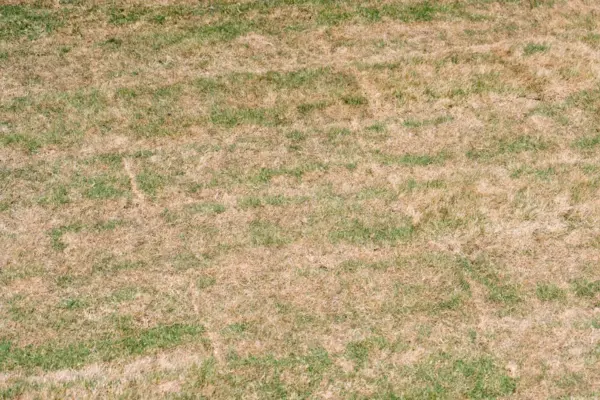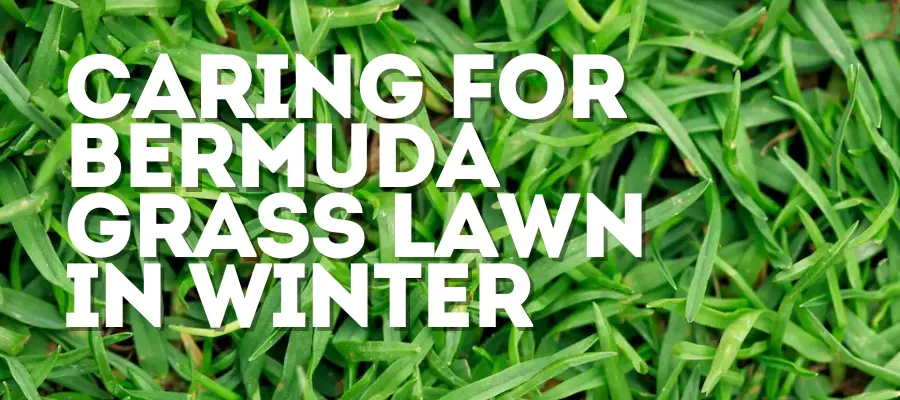Bermuda grass, known for its resilience in hot climates, takes on a unique set of needs during the colder months. It’s not a grass that thrives in the frost, so as winter approaches, your maintenance practices shift to help your Bermuda lawn survive and prepare for a strong spring.
In this article, we’ll walk you through everything you need to know about caring for Bermuda grass lawn in winter. From mowing to pre-emergent applications and weed control, we’ve got you covered. Additionally, we’ll highlight the Best Winter Lawn Fertilizers to ensure your lawn stays nourished and ready for the upcoming growing season.
Understanding Bermuda Grass Dormancy in winter

Bermuda grass naturally goes dormant in winter. This means it stops growing and turns brown as it conserves energy. Although it looks dead, the roots are still alive and waiting for warmer temperatures to kickstart growth again.
Why Dormancy Matters
Soil Health: Even though the grass looks brown, the roots are still alive and crucial for the next growing season.
Scalping Your Lawn
Scalping involves lowering your mower to cut the grass as short as possible. This helps remove dead material and allows sunlight to warm the soil faster.
How to Scalp
Full Scalp: Set your mower to its lowest setting and cut off the brown grass. This lets the soil get more sunlight.
Gradual Cutting: Alternatively, lower your mower a little each time you mow to manage clippings better.
Benefits of Scalping
Faster Green-Up: Opens up the soil to sunlight, helping it warm up quicker in spring.
Reduces Thatch: Thatch buildup can suffocate new grass, so scalping helps manage it.
Tips
Clip Management: Dispose of clippings properly, whether by bagging or composting.
Timing: Do this before the first frost but after the grass has fully entered dormancy.
Applying Pre-Emergent Herbicides
Pre-emergent herbicides prevent weed seeds from germinating. Applying them in fall helps keep weeds at bay before they start growing.
How to Apply
Granular or Liquid: You can choose between granular or liquid pre-emergents. Granulars are easier to spread, while liquids offer precise application.
Watering: After applying, water the area to help the herbicide reach the soil. For slopes, use light waterings to prevent runoff.
Benefits
Weed Prevention: Helps stop weeds before they start, reducing the need for weed control in spring.
Consistent Use: Applying twice a year (spring and fall) improves effectiveness over time.
Tips
Avoid Disturbance: Don’t mow or disturb the soil after applying pre-emergent. Let it settle to form an effective barrier.
Managing Winter Weeds
Even in winter, weeds can appear. Proper weed management depends on the temperature and type of herbicide used.
Weed Control Tips
Post-Emergent Herbicides: Use these when temperatures are above 50°F. They are effective against existing weeds.
Manual Removal: For small weed patches, hand-pulling is an easy and chemical-free option.
Common Winter Weeds
Annual Bluegrass: Thrives in winter. A pre-emergent can help control it.
Henbit: Another common winter weed that pre-emergents can prevent.
Fertilizing in Winter

While Bermuda grass doesn’t need fertilizing during dormancy, a late fall application can be beneficial. This gives the grass nutrients to help it survive winter and green up quickly in spring.
When to Fertilize
Late Fall: Apply a slow-release, nitrogen-rich fertilizer in October before the grass goes fully dormant.
Alternatives
Compost: Adding compost can provide nutrients without the risk of burning dormant grass.
Tips
Avoid Over-Fertilizing: Too much fertilizer in winter can harm the grass. Stick to a recommended amount.
Irrigating Your Bermuda Lawn in Winter
Winter watering is minimal but essential. Your Bermuda grass needs some water to stay healthy but doesn’t require as much as in warmer months.
Winter Watering Guidelines
Reduce Watering: Water about 0.25–0.5 inches every 2-3 weeks. This is enough to keep the soil moist without overwatering.
Avoid Overwatering: Too much water can lead to disease and fungal problems.
Tips
Slope Management: If your yard has slopes, use multiple light waterings instead of heavy watering to prevent runoff.
Conclusion
Caring for your Bermuda grass lawn in winter is crucial for ensuring a vibrant and healthy lawn when spring arrives. By understanding dormancy, scalping effectively, applying pre-emergent herbicides, managing weeds, and following proper fertilizing and watering practices, you set the stage for a lush green lawn.
Winter care may seem minimal, but these steps make a significant difference in the health and appearance of your lawn. Embrace these simple practices to keep your Bermuda grass in top shape and enjoy a beautiful, green lawn as soon as the warm weather returns.

